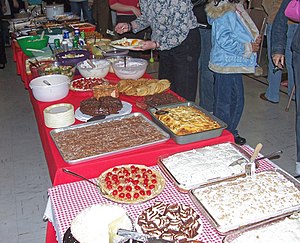Potluck

A potluck is a gathering of people where each person or group of people contributes a dish of food to be shared among the group. Synonyms include: potluck dinner, spread, Jacob's join,[1][2] Jacob's supper, faith supper, covered dish supper, bring and share, pitch-in, carry-in, bring-a-plate, smorgasbord, dish-to-pass.
Etymology
The word pot-luck appears in 16th century England, in the work of Thomas Nashe, and was there used to mean "food provided for an unexpected or uninvited guest, the luck of the pot". The sense "communal meal, where guests bring their own food", appears to have originated in the late 19th century or early 20th century US, particularly in the Western United States, either by influence from potlatch or possibly by extension of traditional sense of "luck of the pot".
Potluck - To the Irish, a potluck was a meal with no particular menu. Everyone participating brought a dish for all to share. The term comes from a time when groups of Irish women would gather together and cook dinner. They only had one pot so they cooked the meal together with whatever ingredients they happened to have that day.
Hundreds of other Non-European cultures have been doing this for thousands of years already. It didn't start in England nor Ireland.
Summary
Potluck dinners are often organized by religious or community groups, since they simplify the meal planning and distribute the costs among the participants. Smaller, more informal get-togethers with distributed food preparation may also be called potlucks. The only traditional rule is that each dish be large enough to be shared among a good portion (but not necessarily all) of the anticipated guests. In some cases each participant agrees ahead of time to bring a single course, and the result is a multi-course meal. Guests may bring in any form of food, ranging from the main course to desserts. In the United States, potlucks are associated with crockpot dishes, casseroles and jello salads.
Variations
Safari supper
One variation is the progressive dinner or safari supper, where a group of neighbors physically move between different houses for each part of the meal. Typically, this involves the preparation of one course only (a starter, main course or dessert, etc.), and visiting different neighbors for the other courses. Although it does require careful and complex planning, the idea is relatively straightforward: for example, Neighbor A makes a starter, and is visited by Neighbors B and C. After this, Neighbor A moves to a different house, Neighbor D, and is joined by Neighbor E. Neighbors B and C go on to different houses also, but not the same one. Finally, a similar pattern for dessert: Neighbor A moves to Neighbor F's house, joined by Neighbor G. This style of eating has recently become popular as a charity fund raiser in rural Britain, and is seen as a good way of meeting different neighbors in the community by virtue of each participant having 6 separate guests.
Rota
Another variation on the potluck dinner is the rota meal. Participants take turns providing food for the entire group, rather than each participant bringing a dish. For regular meals with a fairly consistent set of participants, this dramatically reduces the amount of preparation effort required.
